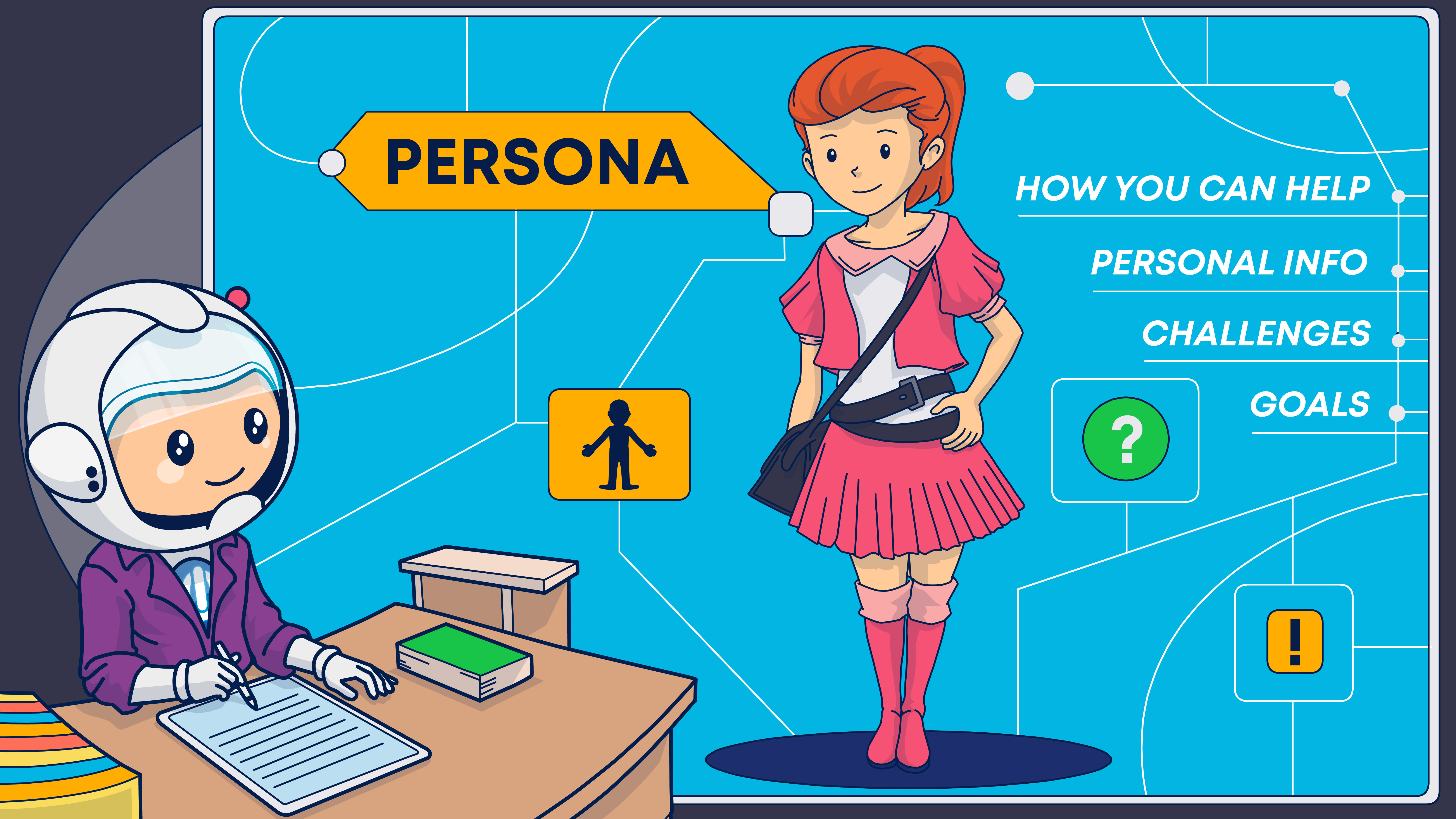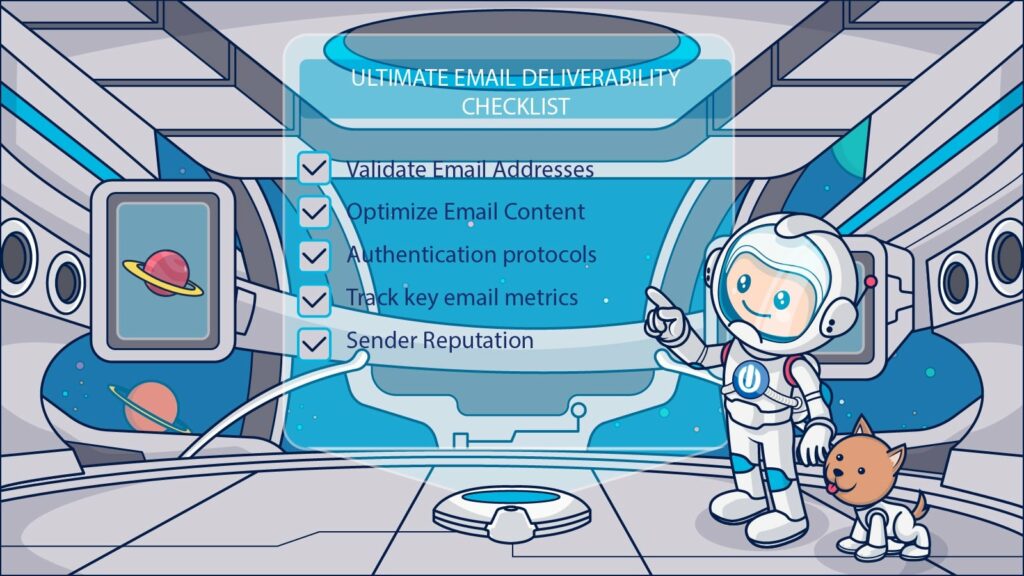Buyer personas help your team visualize your ideal customer and understand the real people behind your KPIs. How can you develop buyer personas that illustrate not only who your customers are but what motivates them to purchase your products or services? And, more importantly, who should be involved in creating your buyer personas? Find out in this article.
Do the people in your organization know the stories behind your customers? Using buyer personas to describe them enables your team members to visualize who they are serving and better target your top audiences.
Buyer or customer personas differ from buyer profiles or audience segments, which offer descriptions based solely on data points. Personas incorporate real and imagined elements to create customer lore, giving your target audiences a backstory.
A well-crafted persona enables your product, sales, marketing, and other teams to adopt a shared understanding of the customers who purchase your products or services and the customers you want to attract.
Using personas also gives you and your team a shorthand way to reference the amalgamation of qualitative and quantitative data you’ve gathered about your target audience, helping with segmentation.
Ah, but that begs the question, who and what contributes to the making of a well-crafted buyer persona? Who should be involved in creating your buyer personas? Don’t worry. We won’t leave you guessing. In the following sections, we’ll expand on what a buyer persona is, why brands use them, and how you can build accurate, actionable buyer personas for your team.
Part I: How to build customer personas that are data-informed and actionable

Buyer personas aren’t popular with everyone. The technique actually gets a lot of criticism. Some marketing and sales professionals view them as time-consuming theoretical exercises that don’t yield accurate or accurate results. Others see them as the marketing version of your daily horoscope–superficial and so vague that they could apply to any situation or none at all.
They’re not wrong, though. A shallow buyer persona based on guesses isn’t useful. A poorly crafted persona can cost your organization time and money by steering your teams in the wrong direction.
When you create buyer personas, it is important to gather as much information about your customers as possible. Then examine your data and consult with teams across your organization to identify which factors are important enough to include in your persona.
Who should be involved in creating your buyer personas?
A buyer persona should provide a 360-degree view of your customer. Getting that view requires examining your buyers from multiple perspectives.
Involving multiple stakeholders in creating a persona will broaden your view. However, this desire for input must be balanced against time and other constraints.
When building your teams and identifying who to consult, select a group that includes both people who know your company’s objectives and people who know your company’s customers.
Add to this list representatives of the teams or departments who will most often use your buyer personas, such as your product development, merchandising, sales, and email marketing teams.
If possible, assemble a cross-departmental team to work on your personas. If you are going it alone, obtain a list of people you can contact from various departments to ask relevant questions and gain feedback throughout the process.
Departments or individuals might be a part of or consult with your persona development team
- Leadership. Gain insights from people with knowledge of current and future business objectives and make sure the personas you’re targeting align with the company’s plans.
- Marketing. Tap this group to get an overview of objectives and discover data about leads, subscribers, customers and target audiences. Within your marketing department, speak to people who perform different tasks. Your PPC lead may know something your email team doesn’t.
- Sales. Representatives of the sales team often have first-hand knowledge about prospects and customers that you won’t find anywhere else.
- Customer service and success. Like the sales team, these individuals are often in customer-facing roles that afford them a unique view of customer pain points, objections, and experiences.
- Product research and development. The people who are researching how to meet new demands in the marketplace and satisfy current customers will have something to say about who those customers are.
- Legal, accounting, or other back office divisions. While members of these departments may have less direct customer interaction, they may have a deeper understanding of the value and risks associated with different customer types and how those manifest. For example, your legal team may be involved with your most contentious customer relationships. Your accounting team may be able to offer insights about the most profitable.
- Customer advocate or insights.You definitely don’t want to leave the people who represent your customers out of the mix when developing your customer personas.
- Your customers. I know it probably goes without saying, but there. I’ve said it anyway. Talk to individual customers, use surveys, focus groups and social listening, and consult your brand advocates or VIP customers.
Consider curiosity an asset as you develop your personas. Keep your eyes and ears open for fresh insights and ideas. What else should you do to improve your personas? Check out the best practices in the next section.
Part II: Why do brands create buyer personas?

The human mind has an enormous capacity for consuming and categorizing information. People have amazing abilities to connect the dots and combine the abstract with the concrete.
That said, most of us don’t sort and distribute information like fields in a database. Instead, we collect a series of concepts and data points to create a mental picture of the whole.
This is one of the reasons people are drawn to a good story and why we often make up stories that combine elements of fact and fiction to convey big ideas and explain complex concepts.
Authors use these common themes and embellish them with their own fictional flair to connect emotionally with their audiences, elicit empathy, and convey their messages in a memorable way.
And it works. For both marketers and kids.
Children around the world are introduced to fables and cautionary tales to teach them valuable life lessons. I remember reading Jean de La Fontaine’s fables (well, the localized versions) written in free verse as a child and learning the consequences of greed, sloth, selfishness, and vanity.
Useful fictions: How buyer personas help us fill in the gaps and see the big picture
The story you build for your customer personas makes them more relatable and memorable for your team. It gives them a common frame of reference when discussing your overarching strategy and specific campaigns.
It answers the questions: Who are we doing this for, and how can we best appeal to them?
Unlike a fable, though, you can’t exercise complete creative license if you want your buyer personas to be useful. The best personas are deeply rooted in fact, with fictional elements added only to add a splash of color and personality.
They are characters designed to represent the significant attributes and aspirations that define a specific segment of your audience. They are genuine composite characters, not superficial stereotypes.
Is it worth doing the hard work to develop in-depth, data-informed buyer personas?
Yes!
Buyer personas humanize your data and focus your team’s attention on what matters.
Think about how people respond to an anthropomorphic or humanoid robot versus one that looks entirely machine-like. Buyer personas don’t smile or move around on two legs, but giving them individual attributes such as personality traits and professional and personal details, humanizes these collections of data points.
This, in turn, helps your team members relate to and feel empathetic toward the customers represented by your avatars. These details also challenge your team to view the data you gather from different perspectives and consider which data points matter when building products and positioning your brand.
Copywriters use buyer personas to help them envision who they communicate with as they write their copy. Engagement with and understanding their audience is one of the secrets to effective copywriting for email and other marketing collateral.
A buyer profile might provide your team with the following information:
| Customer Profile 1 | |
| Age | 35 to 42 |
| Gender identification | F |
| Annual income | $55 to $65k |
| Average order value | $75 (50th percentile) |
| Order frequency | 1 x per month |
| Relationship status | Single |
Um… okay. That’s not a lot for your marketing team to go on if they are trying to create a marketing campaign.
A buyer persona gives them much more.
A typical buyer persona tells the customer’s story. It might look something like this:
| Single Shopper Shelly 💃 |
| Shelly is a 38-year-old woman who lives in Fairfax, VA. She is single and earns approximately $60,000 annually working as an EMT. Her job can be stressful, but she occasionally has downtime between runs. She enjoys reading books and dancing during these breaks but has recently begun looking for something more productive to do during this time. She is considering taking an online course to learn more about management. Shelly dates occasionally but isn’t interested in a long-term relationship. She is currently renting a home but would like to purchase a house so she doesn’t have to worry about finding rentals that accept pets. She has a large dog and maintains a fish aquarium. “I really appreciate being able to order supplies online. It means that I get to spend my time doing what I enjoy instead of running from store to store looking for the right items,” says Shelly. “I do wish that I could find more items that use low or no packaging,” she adds. “I care about the environment, of course. But extra packaging also means extra trash and I have to pay more for trash pickup when I go over.” Shelly orders household and pet supplies once a month, and her average order value is approximately $75 each time which is in the 50th percentile among all customers. |
Wait! Is all this information about Shelly relevant? How does it help your team?
Well, it might not. Deciding what information about your customers is relevant and will help your team improve their performance is one of the challenges of creating buyer personas. However, the above description does give us some useful hints about how to appeal to Shelly.
This story tells us that Shelly is aspirational. She wants to advance her career and needs to earn more (or save more) to purchase a home. She’s also a giver. She cares for other people at work and for her pets during her leisure. That’s something your sales or marketing team could work with!
Buyers like Shelly might respond well to a give-back campaign that makes a charitable contribution for every purchase or a campaign highlighting premium pet care products. Shelly is also interested in saving money. She might respond well to subscription or discount offers that help her cut costs.
What’s the bottom line?
Building and using buyer personas:
- Enhances your understanding of your target market by forcing you to dig deep into your data and ask probing questions.
- Helps team members relate to your customers by humanizing them.
- Facilitates communication between team members and departments by providing a shared language.
- Gives your creative teams a point of focus when developing solutions and distribution strategies.
- Supports strategic decision-making and prioritization by providing a manifest reminder of who your brand serves.
Where do buyer personas fit into your audience identification hierarchy?
Buyer personas and buyer profiles aren’t the only methods brands use to identify, categorize and describe their target market and customers. These two descriptive formats are part of a larger process of collecting and communicating information within your organization.
The buyer personas you create will be the endpoint of a process of audience refinement that begins with defining the total available market and selecting a realistic segment to pursue. The following tools and metrics are part of that winnowing process.
📐Market size estimates define a brand’s potential audience and break it down further into:
- Total addressable market (TAM). This represents the entire body of people or businesses that might purchase your business’s goods or services. Most companies don’t reach the TAM in their niche because they can’t or don’t want to.
- Serviceable available market (SAM). The serviceable available or addressable market is the part of the TAM that you can realistically reach. Legal, logistic, and technological limitations can limit the size of your SAM.
- Serviceable obtainable market (SOM). Even if you can reach every consumer or business in a particular market, that doesn’t mean you will. Your SOM reflects this reality. Choice and/or competitive forces may limit your SOM. The production and distribution capacity, marketing strategy, and the market share held by other brands all affect this number.
Ecommerce, SaaS, and other brands that distribute goods or services globally can have large potential markets. But most will narrow their focus from “everyone who can be our customer” to a smaller portion of the SOM by defining one or more ideal customer profiles.
📐Ideal customer profile (ICP). Like buyer profiles and personas, an ideal customer profile is an internal communication tool. But this one is used to guide your brand’s lead generation efforts by defining the characteristics of a good lead.
A staffing and recruitment agency might serve two primary markets: job seekers and employers. But, most agencies don’t target every type of employer or every type of job seeker. Instead, each agency has a selection of ideal customers that it wants to attract. How many ICPs and how broadly they are defined will depend on the organization.
For example, a consumer ecommerce brand might define its ideal customer as anyone who purchases the goods that the brand offers through online channels. That’s a pretty big market to target, though. Some brands opt to start smaller, aiming their product and marketing efforts at a narrowly defined ideal customer using a profile based on demographic and psychographic characteristics.
Ideal customer profiles indirectly define a brand’s least desirable customers, as well. By omitting certain attributes from the ideal profile, your organization communicates who you don’t want to appeal to. This information helps your teams focus their resources on the right audiences.
Information from the ICP is also useful for lead scoring and evaluating the effectiveness of various campaigns.
Are you attracting the right attention with your paid ads or lead magnets?
Your ICP may be based on historical data, such as which types of buyers have the highest lifetime value, or be aspirational. You might define a persona-style ICP to guide sales and marketing teams in developing customer acquisition strategies to enter a new market.
📐Buyer profiles. As I mentioned earlier, these profiles are fact-based and tell you who your customers are. Buyer profiles are a data-informed way of segmenting your current customer base.
You can use this information to develop or refine your ICP and identify where your wishes don’t match your reality. Of course, buyer profiles also help your product, sales, and marketing teams get a high-level view of who your customers are.
This information contributes to better-informed implementation of account-based marketing, relationship marketing, or lifecycle marketing campaigns.
Buyer profiles rely heavily on quantitative data drawn from your customer data sets. You can pull together information from your ecommerce data, CRM, and email marketing platform and import additional information from third-party providers to put together your buyer profiles.
Most organizations will have more than one buyer profile. Buyer data might be grouped into profiles using internal performance metrics or behavioral data, or external data such as the buyer’s demographic attributes.
Buyer profiles are a quick way to communicate the relevant information about a buyer or audience segment. Your organization may use ideal customer, target audience, or buyer profiles as the format to say who belongs in a segment like the ones you use for your email marketing campaigns.
Creating these documents to define different cohorts within your target market keeps everyone aligned.
📐Buyer personas. This is it! This is the point in your where buyer personas come into play as you narrow down your target audiences.
You’ve collected your data, sorted and categorized it, and decided which groups your organization is or wants to target. Now you can create individual buyer personas to represent those various segments or profiles.
Your buyer personas should combine qualitative and quantitative data about the customers you have and the ones you want to have to provide your team with the complete picture. Of course, the more information you gather, the more complete and accurate your persona picture will be.
In the following sections, I’ll explain how you can gather that information and how to create actionable buyer personas for your brand.
Best practices for building effective buyer personas

An actionable persona tells a story supported by facts. It weaves together customer data points with customer pain points and opinions to form a narrative that reveals the motivations and drives of a particular segment. And it takes a lot of research and analysis to build one.
Apply these best practices throughout your creation process to get high-quality personas that inform your email marketing team and other departments.
- Develop a buyer data questionnaire template and a buyer persona template to guide your data collection and persona formation process. Test your template as you build your first persona and solicit feedback on its effectiveness from members of your team. Once you’ve proven this template to be workable and complete, add it to your workflow for building subsequent personas.
- Use multiple data sources and collection formats to compile data about each persona. Collect qualitative and quantitative data from direct and indirect sources. Mine both structured and unstructured data to learn about your customers and prospects.
For instance, use your CRM and other resources to gain information about average order values, the professions of your most valuable customers and demographic information. Then conduct one-to-one interviews with customers and members of your sales and customer success teams to learn more about your audience’s specific pain points and purchase motivators.
- Avoid making assumptions and actively screen your output for biases. Buyer personas can be a useful shortcut to communicate about your audience but don’t take too many shortcuts in building them or you’ll end up conveying the wrong message to your team.
One of the reasons that fables and fairytales convey their meanings so effectively is because of our shared understanding of the stock characters that find their way into these stories. The fox is always sly. The mouse is always shy but brave. Kings are either wise and benevolent or foolish and cruel. But shared understandings sometimes lead us to rely on stereotypes and biased assumptions.
Avoid this pitfall as a persona builder by being self-aware of the potential for bias that we all have. Include relevant, factually supported details in your personas and invite your teams to ask questions and question their own assumptions when using your personas.
- Pursue quality and quantity when gathering customer data for your personas. One of the reasons for buyer personas’ bad reputation is that they lack depth. This happens when a brand makes several of the mistakes I’ve already mentioned like relying on stereotypes.
Is the fox really sly? What kind of research points to that conclusion? What percentage of foxes trick geese and other animals into their dens and eat them up? Do the foxes in your customer base engage in this kind of trickery?
Did anyone ask the foxes for their side of the story? Maybe foxes are just misunderstood.
In our article about A/B testing, we learned that not all data is statistically significant. The more data you have the more reliable the output based on that data will be. Combine your statistically significant aggregate data with sentiment analysis and in-depth interviews to deepen and validate your results.
- Use your buyer persona to convey the data most relevant to your teams. You’ll gather a lot of information about your customers when building your buyer personas. That doesn’t mean all of this information is persona-worthy.
Be strategic about the information you decide to pass on to your teams via your buyer personas. Include the information that will answer their questions about your customers and help them perform their jobs better. Ask your teams for feedback as you develop your first few personas and incorporate their suggestions into your final template.
- Avoid using insensitive, non-inclusive, or derogatory language when creating your personas. You may be wondering why this even needs to be mentioned. But sometimes we use -ist language without realizing it.
Many descriptive terms–like the kind you might choose to add flair to your persona names–are rooted in discriminatory language that may be interpreted as racist, ableist, or in some other way insensitive.
Even when you are describing your anti-persona (or the buyers you don’t want to attract), you don’t want your team to use language that is negative or offensive. Keep these standards in mind when creating your persona interview questions or surveys, too.
Modern brands are accessible and inclusive, and your personas should reflect those values.
- Remember that customer personas are a tool (but not the only tool) for understanding your audience. Buyer personas serve several purposes that contribute toward achieving your organization’s objectives. However, you can’t rely on personas alone.
Remember that they are just one point of reference in your targeting hierarchy and that targeting is not the only factor influencing your product, sales, and marketing strategies. Keep your head on a swivel and your eyes open for new ways to grow.
- Revisit and update your buyer personas regularly. Speaking of keeping your head on the swivel, disruption is your constant companion in today’s marketplace. Even the most classic fables can use an update now and then. Keep your personas fresh.
Constantly review and update your buyer personas to reflect changes in your customers’ behaviors and preferences along with any modifications to your business’s strategies and objectives.
- Systematize your process for creating customer avatars once you’ve perfected them. This isn’t just a persona-building best practice. Perfecting and then systematizing your business process is a productivity hack that you should use for all your marketing efforts–especially when you are handling high-volume campaigns. Scaling can’t happen without systemization.
There’s no reason to reinvent the wheel every time your brand moves into a new segment or your ideal customer profile changes. Once you have a persona package that works, make templates, workflows, and checklists for each step in the process.
Now, let’s look at the process for building illuminating buyer personas.
A Step-by-Step Guide to Creating Buyer Personas
🧩Step 1: Gather your initial customer data
Every good buyer persona starts with research. You need to identify who your customers are and which customers are most valuable to your business. This first step should be a broad sweep that collects the data and houses it in a single dataset so you can manipulate it and create aggregated reports to help you identify patterns and commonalities.
The information that you’ll be looking for at this stage includes:
- Demographic data such as their age, geographic location, income and relationship status, professional title, and similar personal details.
- Psychographic data such as their interests, values, personality and beliefs. Psychographic data about your customers’ shopping or decision-making style can be particularly useful when crafting a buyer persona.
For example, competitive buyers want to feel like they’ve leveraged their knowledge to gain a competitive advantage when negotiating a deal, while humanistic buyers, on the other hand, are motivated by connections. Some shoppers act on impulse, while others take their time to make a decision.
- Behavioral data, including the customers’ interactions with your website and apps. Behavioral data may also include information you have about your customers’ uses of your products or services, their customer service interactions, and their purchase histories. It is possible to identify brand loyalists, mobile shoppers, and frequent reviewers by using behavioral data. You can also mine your sales data to uncover customers’ preferred payment methods and delivery options.
- Customer value metrics are a subset of behavioral data related to the recency, frequency, and monetary value of your customers’ interactions with your brand. Relevant metrics in this category include average order value, lifetime value, and gap analysis. Depending on how to collect and categorize your information, you might include referral rates and similar non-direct value metrics in this data set as well.
- Engagement data that indicates how often customers respond to your emails, provide feedback, converse with your chatbot, or interact with your brand on social media. Are your highly engaged customers also your most valuable? Sometimes a brand’s biggest supporters aren’t customers at all, especially when the brand products or services are expensive or exclusive.
- Customer feedback and sentiment data which may include star-ratings, online reviews, complaints, and other structured or unstructured input.
You may already be collecting and using much of this data to personalize your email marketing campaigns.
This first stage of data gathering should focus on information you already have or can acquire easily from data enrichment services or other third parties. Even though you may have some unstructured information that you can use, most of your information at this point will be quantitative.
Use this information to select your persona segments and to investigate further once you’ve decided which personas to develop.
Combine data from either your customer relationship management (CRM) app, data warehouse, retail management, revenue intelligence, customer data platforms, and your email marketing platform analytics to build a rich data set from which to build your personas.
🧩Step 2: Create your top-level customer segments
As email marketers, we talk a lot about audience segmentation. But that type of segmentation takes place close to the bottom of your audience identification hierarchy. The segmentation I’m talking about here is not nearly as granular–at least not at the start.
At this stage, your goal is similar to the type of segregation you would do to develop your email lists. You want to create groups that have enough relevant characteristics in common that it makes sense to treat them as a persona-worthy cohort.
What are some types of buyer personas that brands use to segment their audiences?
The types of characteristics and how granular you want to get with these segments depend on your organization’s business model and objectives. If you are new to the buyer persona game, you may want to select one high-value segment to begin with. Figure out who they are and define these buyers so your team can maximize their approach to this audience.
Are there any commonalities that distinguish your highest-value customers from others?
Do your best customers tend to come from a few industries, geolocations, or interest groups?
Answer these questions to begin building actionable segments.
Alternatively, you can build your segments based on their stage in the buyer’s journey or non-value-related criteria. You may even choose to create segments based on objective-driven factors such as “customers we’d like to keep” vs “customers we aren’t that interested in pursuing.”
Examples of different buyer persona types that you may uncover during your research:
- Discovery, decision-making, and shopping-related buyer personas such as
- The competitive shopper
- The investigator
- The impulse buyer
- The deliberative decision-maker
- The early-adopter
- The trend follower
- The bargain hunter
- The tactile or try before they buy shopper
- The waffler (or indecisive shopper)
- B2B buyer personas may include
- The corporate leader
- The ambitious climber
- The work-life balance seeker
- The inside influencer
- The buck-stops-here decider
- The individual contributor
- The consensus builder
- The skeptic
These are just a few examples and the personas that matter most to you will be driven by the unique characteristics of your business. You can often find examples by searching for personas within your industry. For example, the personas a recruiting agency develops may have similar personality traits to those of a chain restaurant. Job seekers and restaurant diners can both be cautious or adventurous. However, the end personas for these two niches will be very different.
Relevance is critical when choosing your segments because your goal is to begin narrowing down your audience into relatable, actionable subsets. Choose characteristics that will guide your team. Do you need to separate your organizational champions from your detractors? Should you develop separate personas for buyers with short decision cycles versus those who take their time?
It’s probably a good idea to sort out buyers who have distinctly different values and priorities to ensure that your messaging hits the mark! Eco Alice may not be thrilled to learn that you’re offering single-serve units with mixed materials packaging. Convenience Cal may not mind a bit.
🧩Step 3: Conduct in-depth research about your selected segment
I’m going to tell you a secret. Some brands stop gathering data at step 2 when building their personas. Instead of digging deeper, they take what they’ve learned about their customers, develop their segments, and then fill in any gaps with fictional details.
This may work for you, if you have a lot of data about your segments or if the data you have is highly relevant. However, you risk missing out on the rich insights that give your persona a realistic backstory if you skip out on the in-depth research step.
Have you ever noticed how some characters on a television series have a deep back story and others don’t even get a name? Now, sometimes a character’s backstory trickles out over time, but the main characters–the ones the writers want you to care about–always have a backstory. Building a lightweight persona is like giving lines to an extra. They’re present for the scene, but no one really cares if they live or die. 🤷♀️
When deciding how much effort you want to commit to building your persona, consider how much you want your team to care about the customers that persona represents. That’s all I’m sayin’.
How do you learn more about your customers?
Ask a lot of questions and do looking and listening.
This stage is all about customer research, but your customers aren’t the only ones you’ll need to consult to get the details for your buyer personas.
You’ll also consult with people inside your organization, gather third-party data, do a little social listening and research the ones who got away. Look for information that can give you a day-in-the-life view of your customers, discover what matters to them, their pain points and deal-breakers, how they communicate and what they value in a brand.
Here are some methods you can use along with the information gathered in Step 1 to build a 360-degree view of your target customer.
Expand your data set with inside information:
- Interview members of your sales, customer service and success, technical support, and marketing teams to gain their insights about your customers. Ask them about the questions customers ask, the objections they raise, and the service or product problem they disclose. Find out which marketing campaigns are most successful and why the marketing team believes those campaigns performed well.
- Send your team members a survey with specific and open-ended questions about your current customers and prospects who didn’t convert.
- Listen to transcripts of sales calls.
- Use heatmap tools such as Hotjar to find out what draws website visitors’ attention.
- Get the FAQs. Look at your organization’s customer service email, call, and chatbot logs. What do customers and prospective customers ask questions about?
- Look at your website, email, and paid advertising analytics. Where and who are your clicks and conversions coming from? Which pages and collateral generate interest, and from what segments?
Go straight to the source:
- Interview your customers via phone, video, or email. Ask short questions to glean demographic information and get their opinions about specific topics. Then add a few open-ended questions that allow your customers to tell you what they want you to know.
How many and what questions should you ask customers in your buyer persona interviews?
You won’t have all the time in the world to interview each customer so ask questions that will expand your knowledge. For example, if you already know your contact’s basic demographic information, skip straight to more probing questions about their buying processes and preferences.
Survey your teams before you begin interviewing to find out their most pressing questions, too. Use this opportunity to add to your greater data set.
Here are some suggested questions to inspire your persona interview prep:
- How do you find new products?
- Where did you first learn about our product or service?
- What made you choose our product or service?
- How would you rate our company’s website? Our emails? Our social media activity?
- Do you tend to shop online or go to local stores?
- Do you research before you go to the store or browse once you get there?
- Do you read online reviews before making a purchase?
- Do you go to third-party review sites to find out about products or services before you visit a vendor?
- Where do you look for reviews or recommendations? Whose opinions do you value?
- What social media channels do you visit? Which channel is your favorite?
- How much time do you spend online each day for non-work purposes?
- Where do you spend most of your time online?
- What is your typical day like? How does our product or service fit into your lifestyle?
- How do you use our products or services?
- How often do you look for the products or services we offer?
- How often do you switch brands?
- When’s the last time you changed brands and what made you switch?
- What social issues matter most to you?
- What impact does a brand’s values have on your decision to shop with them?
- Do you believe most brand’s actions are true to their stated values?
- How credible do you believe most businesses are?
- Does the credibility of a business matter to you?
- How important is price when you are choosing where to make a purchase?
- Are you happy with the payment options most brands offer?
- Are you happy with the payment options our business offers?
- What other payment methods would you like to be able to choose?
- How often are you frustrated because of a late delivery?
- Do you prefer fast delivery over scheduled deliveries?
- How important is free shipping to your purchase decision?
- Do you usually have items delivered at home or work?
- Do you most often shop for yourself or others when you purchase from us?
- How many people in your household do you do the shopping for?
- Who usually decides where you’ll go when you dine out?
- Who usually decides which stores or brands you’ll purchase?
- What do you like best about our product or service?
- What don’t you like about our product or service?
- If you could change one thing about your experience with our business, what would it be?
- What about other products similar to ours, are there things you really love? Things you hate?
- What features are must-haves for this product or service?
- When you have a question, do you prefer to find the answer on your own or would you rather speak to someone in person?
- What do you do when you have a question about a product or service and can’t find the answer on the business’s website?
I bet you can come up with some great questions to ask that are specific to your brand. Ask about colors, flavors, packaging, installation… whatever helps you define your target audiences’ unique wants and needs.
- Send customer surveys (long or short) to gather information at scale. Choose questions relevant to the buyer persona you’re building or send a wider survey and segment the results during analysis.
For instance, carb-free soda manufacturer Zevia uses email to invite new customers to visit its website to complete a multiple-page survey that gains their input regarding new flavors and feedback about the existing product lines. These questions can be used to better understand what works and doesn’t for the brand and develop new products.
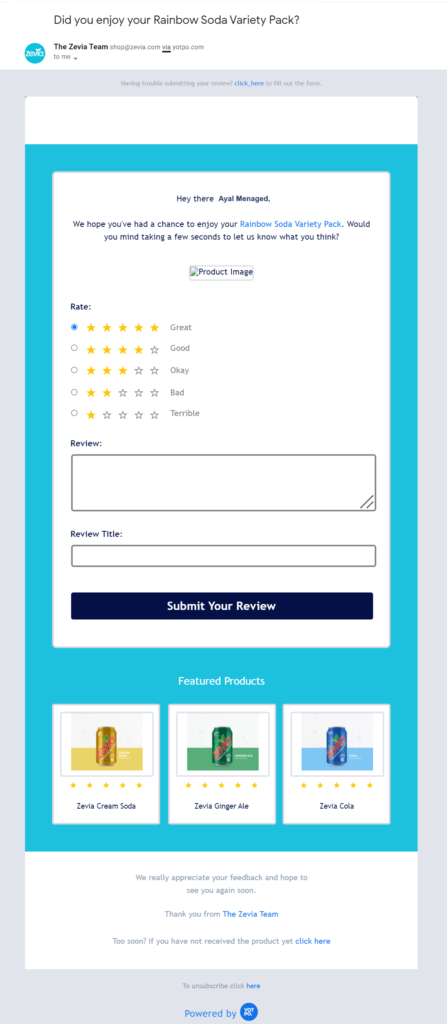
Zevia uses a survey to find out how subscribers feel about their latest purchase via email.
- Use sign-up forms, preference centers, quizzes, polls, pop-ups and gamified elements to gather additional data about your customers and website visitors.
In the following example, L’Oréal Paris asks a few starter questions when visitors set up an account and subscribe to the brand’s newsletter. Then, it invites subscribers to add more details to create their personal beauty profile. This information helps the brand understand its audience and provide customized attention.
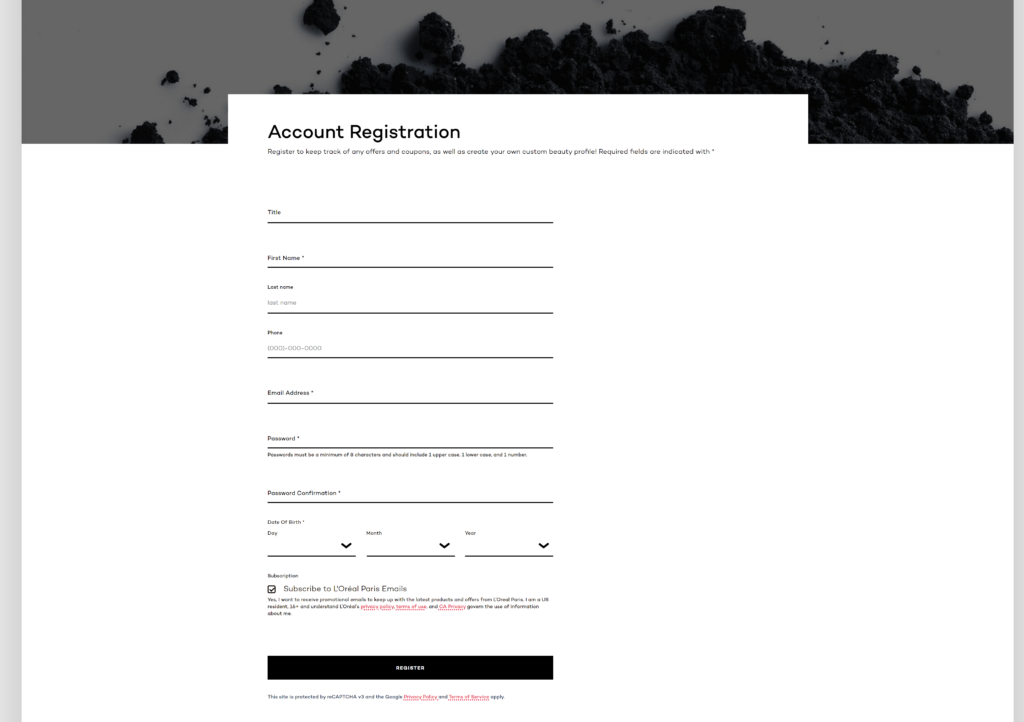
- Mine online reviews (about your brand and your competitors) for insights into customer likes and dislikes, pain points, and complaints.
Look for additional clues inside and outside your organization:
- Scan your social media accounts for customer comments and use a social listening service to track your online mentions.
- Use sentiment analysis to get summaries of trending topics surrounding your brand and find out which way the consumer winds are blowing.
- Evaluate purchase and return trends and correlate the results with your various customer segments. Are some cohorts more likely to send items back than others?
- Look at industry and public research publishers to uncover larger trends related to different demographics or other groups. Purchase reports about your industry or audience segments to fill in the gaps in your data set.

Reports prepared by brands in other industries, like this State of Video Report from Wistia, can be useful sources of data about your customers.
After you’ve collected all this amazing information about your customers, it’s time to start putting it all together into an actionable avatar. That’s the next step.
🧩Step 4: Consolidate and process what you’ve learned about your customers
If you love connecting the dots across divergent sources and types of information, you are going to love this step. For the rest of us, strap in, it’s about to get bumpy. I’m kidding. You’ve been living with this data for weeks–maybe even months–by this stage. Now, you finally get to do something with it!
Settle down with your favorite method for recording your thoughts and start recording your thoughts about your first persona. This is a first draft so it doesn’t have to be neat or concise. Record whatever comes to mind about this buyer type. Don’t worry about relevancy, you can work that out later. Do be sure to include links back to any sources you use so you don’t have to hunt for them later.
Include the basics that you would provide in any buyer profile. Then, expand your notes with deeper insights and give your persona a backstory. What makes this persona stand out? What characteristics do you believe motivate this buyer to move along their customer journey? What would make them leave your brand or seek alternatives? What do you think your sales and marketing teams need to know about them?
🧩Step 5: Refine your thoughts into a one-page customer avatar
Congratulations, the hard parts are over. Now, you just need to cut the fluff and fine-tune your narrative. Take the information you recorded in the previous step and pull out the best parts. Sort the information into logical sections and give each one a heading, so your persona document is easily scannable. Read through your buyer persona from start to finish to see if there’s anything you need to add or remove. Oh, and add a picture.
Use our buyer persona template or search for buyer persona examples in your industry to get ideas for formatting your customer personas.
🧩Step 6: Get feedback from your avatar’s users
Once you’ve built your buyer persona, share it with people from the teams that will be using it. Ask them if the information is useful and understandable. Also, ask a few of your testers to tell you, in their own words, to describe the person your persona represents. Does their perception match your intentions? If not, continue to investigate the mismatch.
Is your persona missing important information? Do you need to modify parts of your persona to overcome implicit biases or incorrect assumptions?
At its core, your persona is a communication device, so this is your chance to make sure you and your persona’s users really are speaking the same language.
🧩Step 7: Put your buyer persona into use and evaluate its performance
The best theories can fail to perform in practice.
You’ve done everything you can to make your persona complete and actionable. Now it’s time to release it into the wild and see if it survives. Put this first buyer persona into use and continue to solicit feedback from your teams about how well it works. Look for indirect methods to monitor how well your persona performs, too. Evaluate the sales and marketing collateral your teams build using your persona. Is it good stuff?
Also, keep an eye on whether people are using your persona and how they are using it. A solution is only as good as its adoption.
Finally, you can use A/B testing to see if your theories about what will appeal to a specific persona pan out. Does our supportive shopper who is looking to save money respond more positively to a subscription savings model or a percentage discount? Does either of these tactics outperform a matching donation campaign? Testing will tell.
And, of course, continue to make improvements until you’re satisfied with the results.
🧩Step 8: Record the persona-building process you followed for posterity
You’ve built a great system, so don’t lose it. Record how you did it and build a repeatable process. Then, test your process by creating your next buyer persona. If all goes well, start to scale and look for ways to automate portions of your persona-building workflow.
Part III: How buyer personas and email marketing work together to drive results

Email marketing and buyer personas are a great combination, and the benefits of this team-up travel both ways.
You can gain valuable information about your target audiences by mining the data you collect through your email marketing platform and by sending your subscribers email newsletters with questions and surveys. Then, you can use that information to build personas that enable your email marketing team to create better-targeted, more personalized campaigns.
Use email campaigns to collect information for your personas
Email allows brands to communicate one-to-one or one-to-many and gain knowledge about their customers through direct and indirect feedback. This owned source of information is a valuable tool for developing unique, well-defined customer personas.
In this example, BeeFree uses its email newsletter to learn more about its subscribers one question at a time with a weekly poll. The interactive format is great for engagement, too.
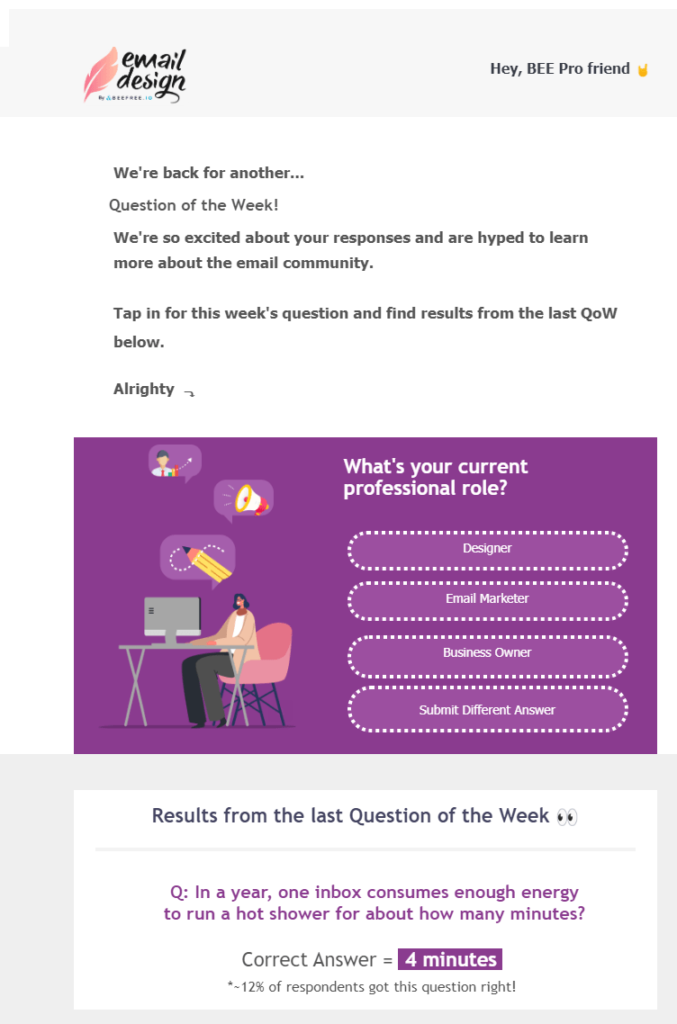
You can also use your emails to ask for direct feedback about specific products or services, or your email content.
Here, we see Webs’ email attempting to determine if customers like their new threads.
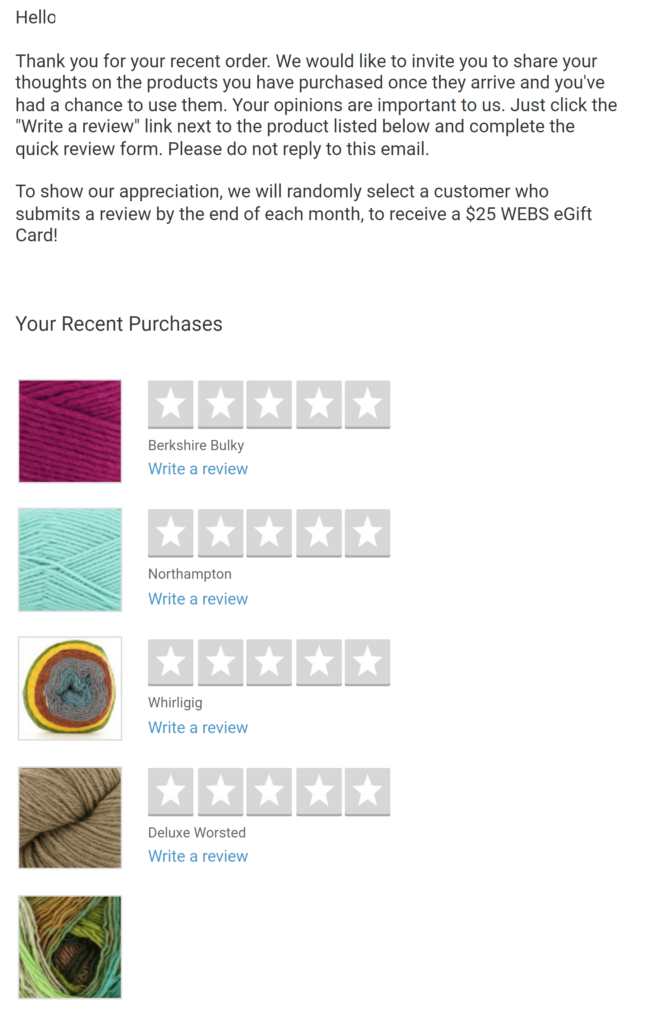
Your email campaigns are also a great vehicle for conducting A/B tests to find out what each of your personas responds to best.
For instance, do your single shoppers prefer content about buying gifts for themselves or for others? Will your married with kids cohort respond to images of products or images of children?
You can test the same content with two different buyer persona segments, too. Your click-through and conversion metrics are a deep well of data to fill in your persona descriptions too.
Use personas to improve your email campaigns
Use your buyer personas to create email segments matching each persona’s characteristics. Then customize email campaigns using the details from your personas. The information from your buyer persona can guide a campaign’s strategy, timing, and content.
For instance, you might choose a referral campaign for your influencer persona and a discount promotion for your price-conscious customer segment.
Alter the language and images, even the overall style of your email, to appeal to your different audiences. Use your personas to create email subject lines that catch subscribers’ attention and increase your open rates. Think of it as developing a brand-within-a-brand voice. Extend your customization to the types of dynamic content you include in your emails, too.
Using a single email template, you can select dynamic content to appeal to shoppers interested in men’s, women’s or children’s clothing, for instance. Do you have one persona that prefers beer and another wine? Put the right product in your promotion using persona-driven segmentation and dynamic email content blocks.
These emails (from different brands) illustrate how knowing your buyer persona can influence your messaging.
📧 An everything-for-everyone ecommerce platform like Amazon or Ebay has many customer types, including individuals and business purchasers. These businesses use some one-for-all marketing campaigns. But they also develop hyper-targeted automated email campaigns to reach specific high-value audiences.

This message from Amazon appeals to several potential personas including foodies, subscription box aficionados and world travelers feeling nostalgic.
📧 Rip Curl sells surfing gear, which already has a pretty narrow target market. That doesn’t mean the brand doesn’t have opportunities to develop personas, though.
The brand can still create different segments based on its customers’ geographic location and the surf they encounter. Since the brand sells clothing items, it could use personas based on body types and gendered-clothing preferences.

Rip Curl’s audience is narrower than “everyone” but still caters to different personas.
📧 Urban Decay has a distinctive brand voice and a variety of products that appeal to different customers. From eye color to hair care, the brand can segment its audience (and its emails) based on their product preferences.

Personas are a valuable tool in your email personalization toolkit. By using all the tools at your disposal, you’ll create engaging emails that target the right audience, at the right time with the right message.

